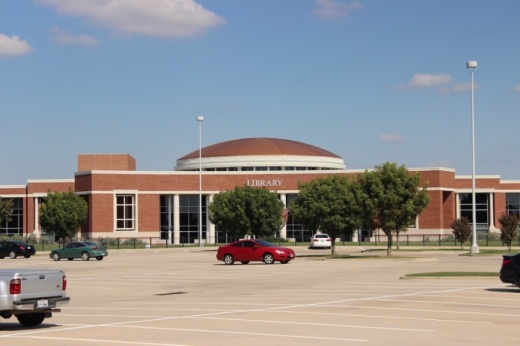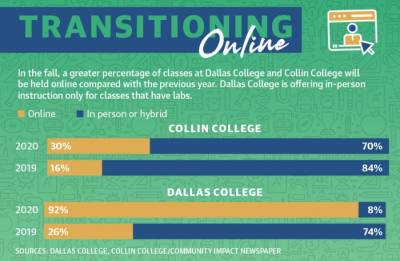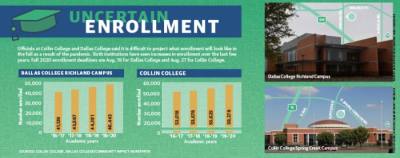Both institutions shifted a majority of their classes online in the spring 2020 semester when COVID-19 made its way into North Texas, college officials said.
As the 2020-21 academic year approaches, leaders of higher education institutions say they will have to wade through changing learning environments, enrollment projections and modifications to workforce education.
“Safety and flexibility are the key considerations for fall,” said Toni Jenkins, senior vice president of campus operations for Collin College.
The plan for fall
The first day of the fall semester for both Dallas College and Collin College is Aug. 24.
Masks are required in public spaces at all times while on both campuses, according to the schools’ restart plans.
Collin College will offer face-to-face, online and hybrid classes. Dallas College, including its Richland campus, will offer the same options; however, only classes that require labs were considered for face-to-face instruction, according to college officials.
“We are really prepared to be in that space and have our students join us in a safe environment where we can support their learning,” Provost Shawnda Floyd said during an Aug. 4 board meeting.
Collin College’s in-person learning option will be available all semester, Jenkins said, but the college is prepared to make changes as necessary. Professors can opt into a remote schedule if they so choose.
Bill Ardis, a professor of mathematics at Collin College, said he had never taught an online class before spring 2020. While he got more experience in the summer, Ardis said he is still unsure whether he will teach in person in the fall.
“I’m kind of torn because I do want to be back in the classroom,” he said. “How am I going to handle how it’s different given the restrictions that will be placed on this course?”
Regional higher education officials warn the evolving nature of the pandemic could cause schools’ return plans to shift.
“The plans for [returning to campus] are based upon what the current [COVID-19] data is showing,” said Ray Martinez, deputy commissioner for academic affairs and workforce education with the Texas Higher Education Coordinating Board.
Leaders from Collin College and Dallas College said it is difficult to predict fall enrollment. Martinez said this uncertainty is common throughout higher education in the state.
“In times of disruption, we did see a lot of impact, particularly to our community colleges in terms of the initial decline in enrollment,” he said.
However, the Dallas-Fort Worth metroplex saw an 8% increase in summer enrollment as compared to summer 2019, according to data from the state coordinating board. Collin College saw a 10.6% increase during that same period.
Jenkins said uncertainty around fall enrollment has to do with shifts in learning formats and with many students not wanting an online experience.
“Our challenge is to figure out how we can do that in the safest way possible,” she said of in-person classes.
Shifting to online
The pandemic pushed several higher education institutions across the nation to transition their course offerings to online.
In the fall, up to 30% of Collin College’s courses will be fully online, per college officials. At Dallas College, more than 90% of classes will be virtual.
However, a fully online schedule doesn’t work for all degree types. Brittney Morales is a Collin College student requiring some in-person learning.
“I am already working in the dental field, so I am in close proximity with patients daily,” she said in an email. “I don’t feel any more at risk attending college.”
Collin College’s skill-based workforce courses require lab sections, Jenkins said. Several of the college’s health care programs require students to show skills in-person so they’re workforce ready upon graduation.
“We’re training people for [what] the labor market needs,” Jenkins said. “I think that that’s a big, important part of getting our economy back on track.”
Miranda Jaimes and Makenzie Plusnick contributed to this report.







